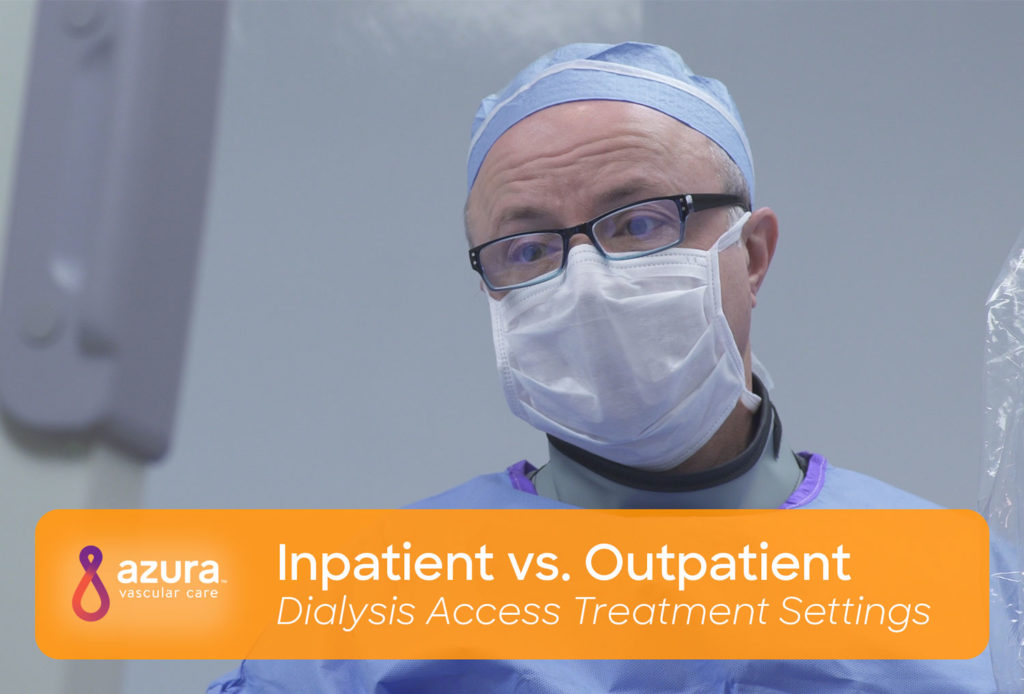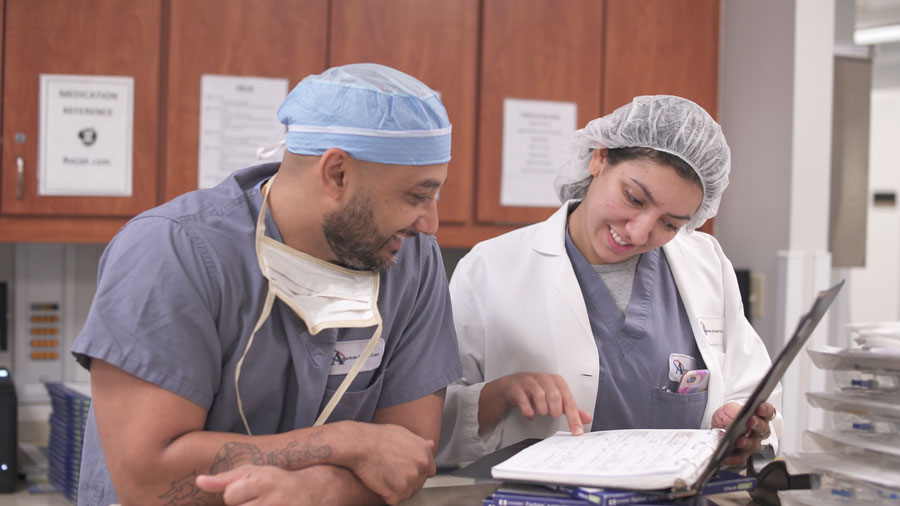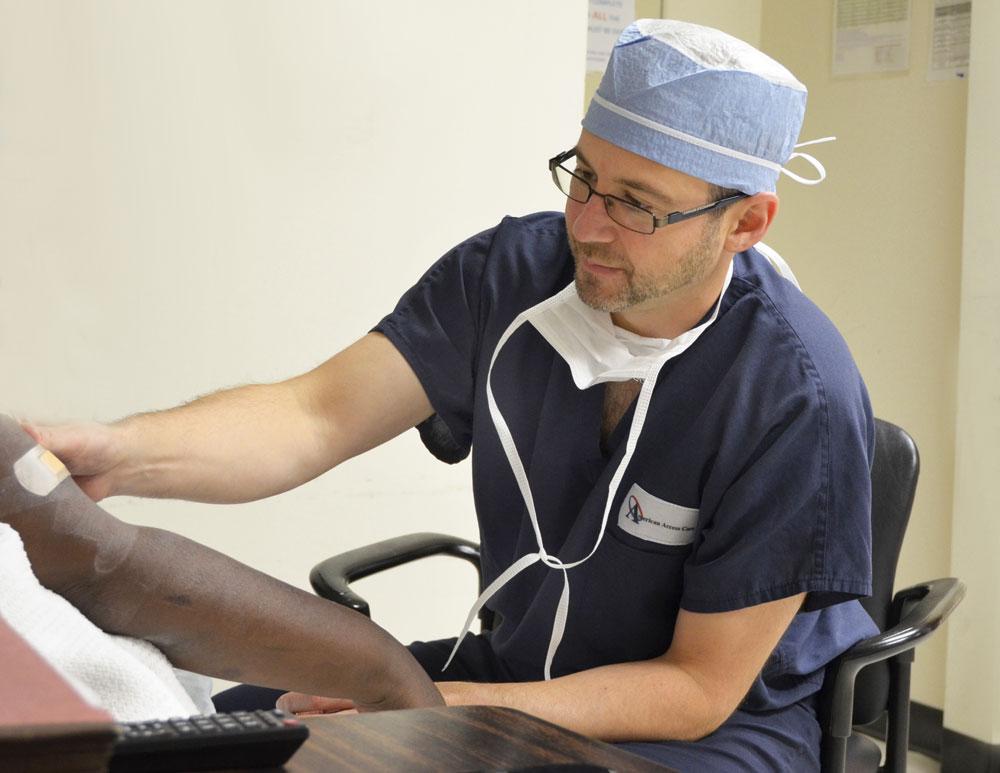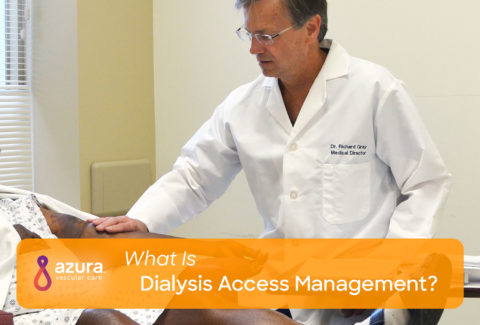
If you will be starting dialysis soon and need a vascular access created, or if you already have an access and need treatment for that access, you have options of where to go for your procedure. In the past, dialysis access procedures were performed in a hospital, but today, these procedures, including access creation, can be safely performed in a convenient outpatient environment. Read on to learn more about the outpatient dialysis access treatment setting.
Vascular Access Centers and Ambulatory Surgery Centers
An increasing number of dialysis access procedures are being performed in outpatient settings known as vascular access centers.
So, what is a vascular access center? They’re specialized clinics that offer vascular access treatment to patients with end-stage renal disease (ESRD). These centers provide focused care from providers who specialize in the field of vascular access services and understand the importance of quickly restoring a dysfunctional access so that ESRD patients may continue to receive their dialysis treatments. (i) Many vascular access centers operate as ambulatory surgery centers. (i)
Ambulatory surgery centers are outpatient facilities where patients can receive surgical procedures while avoiding the complexities of a hospital admission. Unlike hospitals, ambulatory surgery centers don’t offer emergency surgery or major medical procedures. Rather, these centers offer an alternative setting for surgical procedures for specific specialties and provide a valuable option for patients who need a procedure that can be planned in advance.
Advantages of Outpatient Dialysis Access Treatment
 Inpatient medical care takes place in a hospital setting and requires an overnight stay. Although inpatient care may be unavoidable with some health concerns, it’s no longer the only option for surgical and nonsurgical treatment.
Inpatient medical care takes place in a hospital setting and requires an overnight stay. Although inpatient care may be unavoidable with some health concerns, it’s no longer the only option for surgical and nonsurgical treatment.
Over the last few decades, doctors have made significant advances in minimally invasive medical procedures. (ii) Many treatments, including access creation and management, are now available via minimally invasive techniques on an outpatient basis. Outpatient dialysis access procedures have many advantages.
Prompt Care
Hospital procedures often take a long time. Even outpatient procedures performed at a hospital can involve a lot of waiting. Some studies have shown that more than 50 percent of hospital procedures are delayed. (iii)
Hospital patients are often asked to arrive for their procedure early and then they wait for their vascular specialist to be available. But in a hospital setting, unexpected emergencies can arise at any time. Many patients scheduled for procedures find themselves facing a long wait because another patient arrived in the emergency room requiring immediate attention.
In an outpatient vascular access center, patients experience a more streamlined registration process with waiting rooms, procedure rooms, and recovery and discharge areas all at the same location. Procedures are scheduled so patients know exactly when they can expect their treatment.
More Options for Anesthesia
Many patients are nervous about surgical procedures because they’re worried about being placed under general anesthesia. It’s true that general anesthesia is necessary for some surgeries, but general anesthesia also carries some risks, especially for elderly patients or those with underlying illnesses. (iv) Many doctors prefer to avoid general anesthesia unless it’s absolutely essential.
Outpatient procedures, including vascular access creation, can often be performed with local anesthesia and sedation. If this type of sedation is an option for you, your vascular surgeon will numb the operative area and then administer a light sedative to help you relax and avoid feeling any pain. Most patients stay awake during their procedure, though they may not remember it afterward. (v)
One-on-One Care
 Hospitals are busy and staff members are often in a hurry. If you choose to have your procedure done in a hospital, you may have limited opportunities to speak to your surgeon. Your surgeon may simply tell you which procedure you’re going to receive, without offering any explanations or alternatives.
Hospitals are busy and staff members are often in a hurry. If you choose to have your procedure done in a hospital, you may have limited opportunities to speak to your surgeon. Your surgeon may simply tell you which procedure you’re going to receive, without offering any explanations or alternatives.
Outpatient clinics offer a more relaxed atmosphere. The staff takes time to speak with each patient individually. Your surgeon will help you review all your treatment options before making a final decision. After your procedure, you’ll receive detailed instructions for follow-up care.
Follow-up Care and Maintenance
After your procedure, you’ll need to see your vascular specialist again to determine if the procedure was a success. You may also require additional care in the future if your access becomes clotted or infected. (vi) Dialysis access management will be an important part of your post-surgical care plan.
An outpatient clinic like a vascular access center provides follow-up care in a familiar setting. You’ll be able to meet with the same nurses and physicians who worked with you during your initial treatment. The staff will already be familiar with your medical needs.
If you choose to have your procedure performed in a hospital, you may face delays, and different physicians and nurses if you need to return for follow-up care. As a returning patient at a vascular access center, your care is the highest priority. The staff will provide you with an appointment as soon as possible, so you don’t have to wait for hours in an emergency room or urgent care clinic.
Know Your Options
If you need to have a dialysis access placed, you have many options. Hospital care is only one possible path. There are vascular access centers that provide the same expert care in a more convenient, comfortable setting. For many patients interested in outpatient dialysis access care and management, vascular access centers offer the safest and easiest way to get your medical needs met.
Do you have questions about your dialysis access? Download our free guide, Understanding Your Hemodialysis Access, to learn more about the options available to you. Then call 866.996.9729 to schedule an appointment with a vascular specialist.
Sources:
(i) Dialysis Vascular Access Coalition. (n.d.). Vascular access centers. Retrieved September 25, 2018, from http://dialysisvascularaccess.org/vascular-access-centers/.
(ii) Mayo Clinic. (2017, December 30). Minimally invasive surgery. Retrieved September 25, 2018, from https://www.mayoclinic.org/tests-procedures/minimally-invasive-surgery/about/pac-20384771.
(iii) Bernstein, M., Kaderali, Z., Khu, K. J., & Wong, J. (2010). Delays in the operating room: Signs of an imperfect system. Canadian Journal of Surgery, 53(3), 189-195. Retrieved September 25, 2018, from https://www.ncbi.nlm.nih.gov/pmc/articles/PMC2878989/.
(iv) Mayo Clinic. (2017, December 29). General anesthesia. Retrieved September 25, 2018, from https://www.mayoclinic.org/tests-procedures/anesthesia/about/pac-20384568.
(v) American Society of Anesthesiologists. (n.d.). Sedation analgesia. Retrieved October 17, 2018, from http://www.asahq.org/lifeline/types%20of%20anesthesia/sedation%20analgesia.
(vi) Stanford Health Care. (n.d.). Types of dialysis. Retrieved September 25, 2018, from https://stanfordhealthcare.org/medical-treatments/d/dialysis/types.html.


